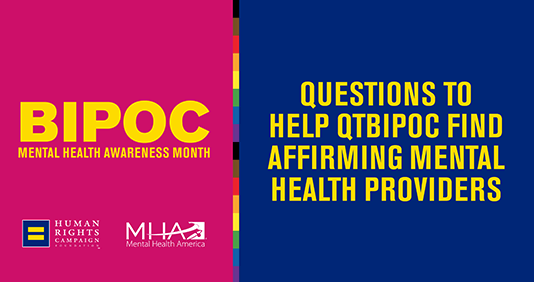This tool was developed in partnership with the Human Rights Campaign. Although it was developed for people of color who identify as LGBTQ+, these are good questions for anyone who is worried about having a therapist who is affirming of your identity.
We know that for many reasons, accessing mental health treatment for queer and trans black, indigenous, and people of color (QTBIPOC) can be challenging. Finding providers that align with your identity can be even more daunting.
Unfortunately, even after navigating barriers to care, QTBIPOC are often still met with therapists that may not have the experience or training to make them culturally responsive and/or LGBTQ-inclusive. We’ve compiled some tips below in the form of questions that you can ask that may help with this — think of it as a therapist interview. Our hope is that asking these questions can eliminate potential stress and even save you time and money from unsuccessful therapist matches.
For mental health provider directories and search engines visit: HRC.im/Help
Here’s a web-friendly version of the questions from the worksheet:
Quick notes:
- The questions listed below are meant to offer you suggestions to choose from; consider selecting between three and six options that resonate with you the most. When you reach out to a therapist, request a 15-20 minute “interview” to ask these questions, or you can send them via email. Remember that it’s normal to have some fear/anxiety around asking these questions and/or anticipating the response; keep this in mind when considering whether to ask these questions in-person or via email.
- We recommend inserting your own LGBTQ and racial/cultural identities in the spaces indicated below to help ensure the provider understands your specific identity and is able to distinguish your experiences from the broader QTBIPOC community.
- Most of the language suggested in these questions includes terminology commonly used in our communities, and that is intentional. A provider’s level of knowledge and comfort responding to terms they may not be familiar with is something that may help you determine whether they are the right fit.
- While some of the questions in the LGBTQ inclusion and racial/cultural responsiveness sections are similar, they are listed separately in an effort to limit the instances of a provider not responding fully to the question or overgeneralizing their response.
- Encourage the provider to be as specific as possible in their descriptions of knowledge and experience (i.e. I’ve treated many clients who’ve shared your identity, I’ve treated some, I’m not sure I ever have, I have very little experience, or I have no experience).
Questions around LGBTQ inclusion:
- How would you describe your experience treating clients who share my [insert your LGBTQ identity here i.e. “trans/
non-binary”] identity? - What training/evidence-based treatment do you/your practice have for issues that may arise related to [insert your
LGBTQ identity here i.e. “queer”] health and wellness? - What is your position on so-called “conversion therapy” — attempts to change a client’s sexual orientation, gender
identity or gender expression? - What kind of resources/training do you/your practice have available to remain up-to-date with [insert your LGBTQ identity here i.e. “bisexual”] issues so that I can avoid having to educate my provider as much as possible?
- How would you describe your experience using gender-neutral pronouns?
- How would you describe your knowledge of safety risks and considerations related to my [insert your LGBTQ
identity here i.e. “queer”] identity? - What training/evidence-based treatment do you/your practice have for trauma from rejection around my [insert your LGBTQ identity here i.e. “bisexual”] identity?
- What is your/your practice’s position on the mental health impact of navigating anti-LGBTQ bias and discrimination?
- How would you describe your knowledge of stereotypes and/or common misconceptions of my [insert your
LGBTQ identity here i.e. “lesbian”] identity — things that you might say in a session that could result in
trauma/microaggression?
Questions around racial/cultural responsiveness
- How would you describe your experience treating clients who share my [insert your racial/cultural identity here i.e.
“Indigenous”] identity? - What is your/your practice’s experience incorporating a racial equity/anti-racist lens into your treatment?
- How would you describe your knowledge of safety risks and considerations related to my [insert your racial/cultural
identity here i.e. “Black”] identity? - What training/evidence-based treatment do you/your practice have for issues that may arise related to [insert your
racial/cultural identity here i.e. “Asian”] health and wellness? - Can you share with me your/your practice’s training/evidence-based treatment for issues that may arise from trauma related to [insert “anti” and your racial/cultural identity here i.e. “anti-Black”] oppression, racism and/or racial violence?
- What kind of resources/training do you/your practice have available to remain up-to-date with [insert your racial/
cultural identity here i.e. “Asian”] issues both locally and nationally so that I can avoid having to educate my provider
as much as possible? - What is your/your practice’s position on the mental health impact of navigating oppression, racism and
racial violence? - What is your/your practice’s position on the impact of generational trauma as it relates to racism/racial violence?
- How would you describe your knowledge of stereotypes and/or common misconceptions of my [insert your
racial/cultural identity here i.e. “Latinx”] identity — things that you might say in a session that could result in
trauma/microaggression?
Questions around intersectional lens
Note: Intersectionality as coined by Kimberlé Crenshaw is a lens through which we seek to understand how multiple forms of oppression/inequality may combine to create unique obstacles and trauma.
- How do you define intersectionality and how do you plan to utilize an intersectional lens in my treatment?
- How can you help me navigate trauma related to the oppression I have and continue to face related to my [insert
your QTBIPOC identity here i.e. “Black trans woman”] identity—understanding there are multiple systems of
oppression impacting my mental health concurrently? - What is your/your practice’s position on the mental health impact of navigating multiple systems of oppression?
"*" indicates required fields

